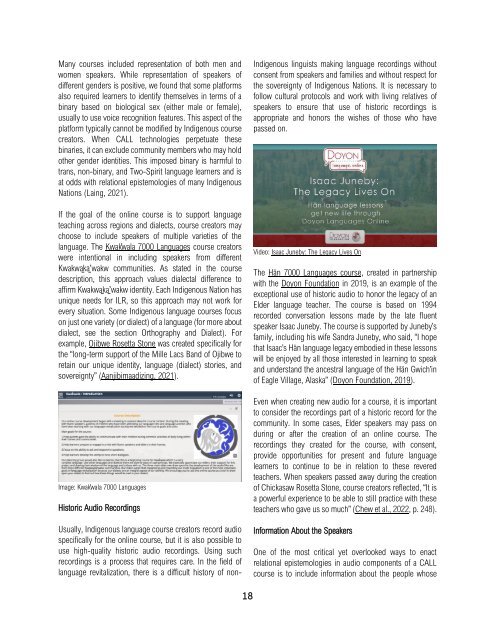Learning in Relation: A Guide to Creating Online Indigenous Language Courses that Center Indigenous Ways of Knowing and Being
by Kari A. B. Chew, Ph.D. (Editor & Author), Melvin Calls Him Jr. (Author), Jackie Dormer (Author), and Courtney Tennell (Author) The purpose of this guide is to share knowledge with Indigenous Nations and organizations, technology developers, and scholars who are working to center and respect Indigenous ways of knowing and being in online Indigenous language revitalization spaces, including Indigenous language courses. Citation Chew, K. A. B. (Ed.). (2022). Learning in relation: A guide to creating online Indigenous language courses that center Indigenous ways of knowing and being. http://hdl.handle.net/1828/14403
by Kari A. B. Chew, Ph.D. (Editor & Author), Melvin Calls Him Jr. (Author), Jackie Dormer (Author), and Courtney Tennell (Author)
The purpose of this guide is to share knowledge with Indigenous Nations and organizations, technology developers, and scholars who are working to center and respect Indigenous ways of knowing and being in online Indigenous language revitalization spaces, including Indigenous language courses.
Citation
Chew, K. A. B. (Ed.). (2022). Learning in relation: A guide to creating online Indigenous language courses that center Indigenous ways of knowing and being. http://hdl.handle.net/1828/14403
Create successful ePaper yourself
Turn your PDF publications into a flip-book with our unique Google optimized e-Paper software.
Many courses <strong>in</strong>cluded representation <strong>of</strong> both men <strong>and</strong><br />
women speakers. While representation <strong>of</strong> speakers <strong>of</strong><br />
different genders is positive, we found <strong>that</strong> some platforms<br />
also required learners <strong>to</strong> identify themselves <strong>in</strong> terms <strong>of</strong> a<br />
b<strong>in</strong>ary based on biological sex (either male or female),<br />
usually <strong>to</strong> use voice recognition features. This aspect <strong>of</strong> the<br />
platform typically cannot be modified by <strong>Indigenous</strong> course<br />
crea<strong>to</strong>rs. When CALL technologies perpetuate these<br />
b<strong>in</strong>aries, it can exclude community members who may hold<br />
other gender identities. This imposed b<strong>in</strong>ary is harmful <strong>to</strong><br />
trans, non-b<strong>in</strong>ary, <strong>and</strong> Two-Spirit language learners <strong>and</strong> is<br />
at odds with relational epistemologies <strong>of</strong> many <strong>Indigenous</strong><br />
Nations (La<strong>in</strong>g, 2021).<br />
If the goal <strong>of</strong> the onl<strong>in</strong>e course is <strong>to</strong> support language<br />
teach<strong>in</strong>g across regions <strong>and</strong> dialects, course crea<strong>to</strong>rs may<br />
choose <strong>to</strong> <strong>in</strong>clude speakers <strong>of</strong> multiple varieties <strong>of</strong> the<br />
language. The Kwak̓wala 7000 <strong>Language</strong>s course crea<strong>to</strong>rs<br />
were <strong>in</strong>tentional <strong>in</strong> <strong>in</strong>clud<strong>in</strong>g speakers from different<br />
Kwakwaḵa̱ʼwakw communities. As stated <strong>in</strong> the course<br />
description, this approach values dialectal difference <strong>to</strong><br />
affirm Kwakwaḵa̱ʼwakw identity. Each <strong>Indigenous</strong> Nation has<br />
unique needs for ILR, so this approach may not work for<br />
every situation. Some <strong>Indigenous</strong> language courses focus<br />
on just one variety (or dialect) <strong>of</strong> a language (for more about<br />
dialect, see the section Orthography <strong>and</strong> Dialect). For<br />
example, Ojibwe Rosetta S<strong>to</strong>ne was created specifically for<br />
the “long-term support <strong>of</strong> the Mille Lacs B<strong>and</strong> <strong>of</strong> Ojibwe <strong>to</strong><br />
reta<strong>in</strong> our unique identity, language (dialect) s<strong>to</strong>ries, <strong>and</strong><br />
sovereignty” (Aanjibimaadiz<strong>in</strong>g, 2021).<br />
Image: Kwak̓wala 7000 <strong>Language</strong>s<br />
His<strong>to</strong>ric Audio Record<strong>in</strong>gs<br />
Usually, <strong>Indigenous</strong> language course crea<strong>to</strong>rs record audio<br />
specifically for the onl<strong>in</strong>e course, but it is also possible <strong>to</strong><br />
use high-quality his<strong>to</strong>ric audio record<strong>in</strong>gs. Us<strong>in</strong>g such<br />
record<strong>in</strong>gs is a process <strong>that</strong> requires care. In the field <strong>of</strong><br />
language revitalization, there is a difficult his<strong>to</strong>ry <strong>of</strong> non-<br />
<strong>Indigenous</strong> l<strong>in</strong>guists mak<strong>in</strong>g language record<strong>in</strong>gs without<br />
consent from speakers <strong>and</strong> families <strong>and</strong> without respect for<br />
the sovereignty <strong>of</strong> <strong>Indigenous</strong> Nations. It is necessary <strong>to</strong><br />
follow cultural pro<strong>to</strong>cols <strong>and</strong> work with liv<strong>in</strong>g relatives <strong>of</strong><br />
speakers <strong>to</strong> ensure <strong>that</strong> use <strong>of</strong> his<strong>to</strong>ric record<strong>in</strong>gs is<br />
appropriate <strong>and</strong> honors the wishes <strong>of</strong> those who have<br />
passed on.<br />
Video: Isaac Juneby: The Legacy Lives On<br />
The Hän 7000 <strong>Language</strong>s course, created <strong>in</strong> partnership<br />
with the Doyon Foundation <strong>in</strong> 2019, is an example <strong>of</strong> the<br />
exceptional use <strong>of</strong> his<strong>to</strong>ric audio <strong>to</strong> honor the legacy <strong>of</strong> an<br />
Elder language teacher. The course is based on 1994<br />
recorded conversation lessons made by the late fluent<br />
speaker Isaac Juneby. The course is supported by Juneby’s<br />
family, <strong>in</strong>clud<strong>in</strong>g his wife S<strong>and</strong>ra Juneby, who said, “I hope<br />
<strong>that</strong> Isaac’s Hän language legacy embodied <strong>in</strong> these lessons<br />
will be enjoyed by all those <strong>in</strong>terested <strong>in</strong> learn<strong>in</strong>g <strong>to</strong> speak<br />
<strong>and</strong> underst<strong>and</strong> the ancestral language <strong>of</strong> the Hän Gwich’<strong>in</strong><br />
<strong>of</strong> Eagle Village, Alaska” (Doyon Foundation, 2019).<br />
Even when creat<strong>in</strong>g new audio for a course, it is important<br />
<strong>to</strong> consider the record<strong>in</strong>gs part <strong>of</strong> a his<strong>to</strong>ric record for the<br />
community. In some cases, Elder speakers may pass on<br />
dur<strong>in</strong>g or after the creation <strong>of</strong> an onl<strong>in</strong>e course. The<br />
record<strong>in</strong>gs they created for the course, with consent,<br />
provide opportunities for present <strong>and</strong> future language<br />
learners <strong>to</strong> cont<strong>in</strong>ue <strong>to</strong> be <strong>in</strong> relation <strong>to</strong> these revered<br />
teachers. When speakers passed away dur<strong>in</strong>g the creation<br />
<strong>of</strong> Chickasaw Rosetta S<strong>to</strong>ne, course crea<strong>to</strong>rs reflected, “It is<br />
a powerful experience <strong>to</strong> be able <strong>to</strong> still practice with these<br />
teachers who gave us so much” (Chew et al., 2022, p. 248).<br />
Information About the Speakers<br />
One <strong>of</strong> the most critical yet overlooked ways <strong>to</strong> enact<br />
relational epistemologies <strong>in</strong> audio components <strong>of</strong> a CALL<br />
course is <strong>to</strong> <strong>in</strong>clude <strong>in</strong>formation about the people whose<br />
18




